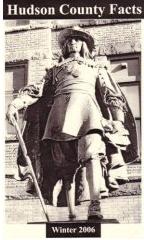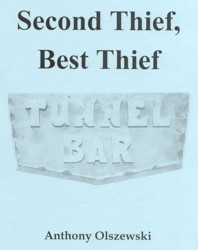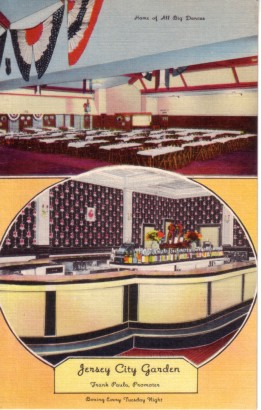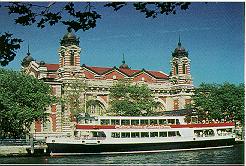
|
|
By David Dayton McKean
Next to his construction of the Medical Center Mayor
Hague points with the greatest pride to his record on the
handling of juvenile delinquency. The Bureau of Special
Service, established in the school system in 1931, has charge
of all cases; this bureau and what he calls `the amazing efficiency
of its work are favorite themes for speeches. On one
occasion the Mayor appeared before a committee of the New
York legislature to tell how Jersey City saves the boy. He
never mentions girl delinquents; it is to be presumed that
Jersey City girls never get into trouble.
The bureau is headed by Doctor Thomas Hopkins, Assistant Superintendent of Schools. In his 1940 report to the
superintendent, he listed its personnel. In addition to the
director, there is an assistant director, a physician, a dentist,
an otologist, an ophthalmologist, three nurses, three psychologists,
a psychiatrist, a supervisor of attendance officers,
twenty-seven attendance officers, ten visiting teachers, five
home-instruction teachers, seventy-eight recreation instructors,
and sixteen members of the police department.
The Mayor told the history and purposes of the Bureau of
Special Service in a long letter to the members of the police
force, dated April 1, 1936, which was made public. The
police were told, `You should familiarize yourself with the
contents of this letter and carefully preserve it for future
reference.'
`During the great number of years that I have been the
head of the government of your city,' the Mayor began, `I
have been observing ... the tremendous increase in the number
of juvenile delinquents to be found in our penal institutions....
Because of my familiarity with the conditions surrounding
our youth and my long experience in the administration
of police and public school affairs, I sought to find the
cause of this situation and a remedy.' The causes, he
thought, were an overreadiness on the part of the police to
arrest `young boys on our public streets for trifling offenses,'
and the sentencing of boys to reformatories by juvenile
courts, which `were working overtime.'
`When I became convinced that these methods were all
wrong, I decided to have them done away with in Jersey
City.... Five years ago the Bureau of Special Service was
established at my direction....' The purpose of the bureau
was and is to protect the boy `from undesirable companions
and associations, checking, re-checking, and encouraging
him to discontinue mischievous, destructive, or vicious
conduct.
`It is the duty of every police officer who may observe any
violation of the law or to whom a complaint is made regarding
a violation of the law by any juvenile, to obtain the name
and address of the juvenile and of any complainant, with the
essential facts in the case, and report them in writing immediately
to the Captain of his precinct.... In carrying out the
above procedure the officer should first take the juvenile off
the street, into a store or home which may be convenient, so
he will not be on public exhibition during the questioning....
I insist that there shall be no arrests, no patrol wagons, and
no police court appearance injected into the carrying out of
this program.'
He appreciated that this plan was difficult: `It is my
special request that you endure any embarrassment or inconvenience
that may come to you in following my instructions.
We must never forget that we have been boys ourselves and
have no doubt been guilty of many thoughtless or lawless
acts and indiscretions, but in spite of that have grown up to
be decent and law-abiding citizens.... I want the police
officer to be more a big brother and a guide to the young folks
rather than to report their every trifling misconduct.... Use
good judgment and that will satisfy me.'
This well-intentioned scheme was in many respects extra-legal, particularly in its authorizing the police to use curbstone
justice in dealing with juvenile delinquents. This aspect
of the matter did not bother the Mayor, however, and a
statement he made in a speech November 10, 1937, on boys
and the law at the Emory Methodist Episcopal Church in
Jersey City obtained for him the next day unexpected national
notice. Two boys both under sixteen, he said, were
apprehended by the authorities for truancy. The Mayor
happened to be in one of his police-station hideouts when
they were brought in. The boys told him that they preferred
jail to school; so he took up their case with Doctor
Hopkins, suggesting that jobs be found for them. Doctor
Hopkins said that it could not be done because of the New
Jersey Working Papers Law. Then the Mayor said to him:
`Listen, here is the law! I am the law! These boys go to
work!'
He got jobs for the boys, though later they returned to
school. The phrase `I am the law' was entirely too apt, and
while he admitted in his testimony in the C.I.O. case that he
had used it, he felt that it had been unfairly turned against
him: `I have never desired to be the law, Counselor. I have
always felt that the courts was the law, and still maintain
that the courts is the law of our state, city, and county.' (Transcript, p. 1235.)
In his last report Doctor Hopkins asserted that the Bureau
of Special Service had cut down commitments to juvenile
corrective institutions 92 per cent. In 1930, 535 boys were
committed; in 1939 only 7. It appeared that Jersey City boys
had such immunity from the police that the force complained
to the Mayor, and in January, 1940, in a speech in Jersey
City he withdrew some of the big-brother requirement:
This Web version, edited by GET NJ, COPYRIGHT 2003
This edict gives the police further authority, but neither
they nor the judges are permitted to send boys to reform
schools except as a last resort. The Bureau of Special
Service is still high in the Mayor's estimation; indeed, in the
same speech he suggested that other cities would do well to
follow the example of Jersey City and establish similar bureaus.
'We must never surrender a boy,' said Mayor Hague,
because he is hard to handle or causes us worry. We must
never say, "We're licked" Oh, it is gratifying to realize
how much we are doing for our youth!'
Hudson County does not have any Bureau of Special
Service, although of course about half of the delinquents can
sent to it as Jersey City residents. The best the county
show is a huge probation office staffed with well-paid
employees:
I want the policeman to be the boss – to rule with iron hand
in his handling of the boy problem. It is the policeman's duty
to make it clear to these lads that crime will not be officially encouraged.
I want you to know that the police officer won't
offend me if he `warms' the young hoodlums. Every time the
policeman gets after him he will serve to warn the boy that
crime is not being coddled or encouraged. As a matter of fact,
far from being offended, I will pin a medal on the policeman
who knows how to save a boy from the consequences of a
crime. The way to save him is not by sending him to prison
but to prove to him that crime doesn't pay. (Jersey Journal, January 3, 1940.)
| Adolph A. Kern, chief probation officer | $7,500 |
| Thomas R. Flaherty, deputy chief probation officer | 5,000 |
| 3 probation officers | 3,600 (each) |
| 4 probation officers | 3,400 (each) |
| 16 probation officers | 2,400 (each) |
| 12 probation officers | 3,500 (each) |
| 22 other employees | Various |
It would appear, however, that the problem of leading boys into paths of righteousness in Jersey City is too big for any special service bureau; the treatment it can give must be at best symptomatic, when every boy sees all about him want of respect for law. How can he be convinced that he must work for his living when church and horse-race gambling encourage him to believe that he can get something for nothing? How is he to be taught that crime does not pay when the folklore of Jersey City is full of stories of men who have made it pay? If he is wide awake he will see plenty of evidence to justify him in concluding that crime does not pay unless one has the proper connections.
| Next |
| Main Menu |

|
|


GRAVE ROBBER Jersey City Computer Repair
297 Griffith Street, Jersey City, NJ - In the Heights just off of Kennedy Blvd. - Very close to Journal Square and Union City, just five minutes away from Hoboken, Downtown Jersey City, Newport, and the Waterfront -


|
|
|
|